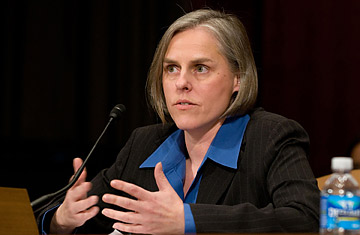
Dawn Johnsen testifies before the Senate Judiciary Committee in Washington on Feb. 25, 2009
Late on April 9, amid a flurry of news over the retirements of Supreme Court Justice John Paul Stevens and Congressman Bart Stupak, the White House quietly backed down from a yearlong battle with Republicans, announcing that Dawn Johnsen, President Obama's pick to lead the Office of Legal Counsel at the Department of Justice, had withdrawn her nomination. The timing, some observers noted, was not accidental.
The bitter fight to confirm the Indiana University Law School professor as the Administration's top legal adviser was hardly the most high-profile nomination battle that the Administration has waged. Nor was it the most vital unfilled job on the Obama bench, sandwiched between a Supreme Court opening and a crucial security position that remains vacant, director of the Transportation Security Administration.
But the rancor around Johnsen's nomination reached an unusual pitch for a position that until recent years was typically filled quickly and without controversy. The vitriol flowed in part because of the candidate herself, with her pro-choice positions and national-security stances. But the other reason was the long shadow that hangs to this day over the office known as the OLC. That shadow is torture.
In the wake of the Sept. 11 terrorist attacks, it was the Office of Legal Counsel that generated the legal memos justifying enhanced interrogation techniques, which some critics prefer to call torture. Johnsen, who headed the office on an interim basis during the Clinton Administration, did not mince words with respect to those memos and the Administration that generated them. Rather, she spoke openly and critically about what she saw as the excesses of the Bush lawyers. Writing in a blog post three years ago, for example, she decried the "shockingly flawed content" of one of the memos, writing that it encouraged "horrific acts" and lamenting, "Where is the outrage, the public outcry?!"
Those comments alone may have doomed her later appointment. It was clear from the start that even with the Democrats' 60-vote Senate supermajority, which evaporated with Republican Scott Brown's election in January, the confirmation would not be easy. And it wasn't, despite support from hundreds of law professors and one Senate Republican, Richard Lugar of Indiana. After her nomination was first reported out of committee, it languished through 2009. Obama had to renominate Johnsen again this year, resulting in a second hearing in March.
Even then, her renomination became a referendum on the past. At one point, Senator Orrin Hatch took the last minutes of his testimony against Johnsen to praise the authors of the Bush-era memos, John Yoo and Jay Bybee, calling them "two brilliant guys" and "very excellent people." Conversely, Democrats split their time between urging support for Johnsen and condemning the Bush lawyers who came before her. The vote to again send her nomination for a floor vote was on strict party lines.
The White House blamed Republican stonewalling for the failed nomination, saying in a statement that "it is now clear that Senate Republicans will not allow her to be confirmed." The Administration counted Senate votes "many times," according to a White House official who requested anonymity, but came up short as the months dragged on. "We made our full case," the official says.
And a recess appointment, which some liberals urged, was out of the question, according to the White House official. Such an appointment sidestepping an up-or-down floor vote would have made Johnsen's goal to depoliticize the Office of Legal Counsel impossible "and would have led to partisan debates over its legal opinions regardless of their quality," the official says.
Johnsen declined to comment to TIME beyond a statement released on April 9, in which she too blamed GOP intransigence. "I hope that the withdrawal of my nomination will allow this important office to be filled promptly," she wrote.
Senator Jeff Sessions of Alabama, the Senate Judiciary Committee's ranking GOP member, said he was pleased with Johnsen's withdrawal. He called her an "unacceptable choice" to fill the position, and wrote in a statement that "it is my sincere hope that the President will nominate someone who is prepared to vigorously defend the military's legitimate actions in the fight against terrorism."
Some liberals who hoped Johnsen would be Obama's tonic to the office under Bush are bitterly disappointed by her withdrawal, and some accuse the White House of not backing their own candidate. But Lee Casey, a Washington attorney who was an attorney adviser in the Office of Legal Counsel in 1992 and 1993, says her nomination may have been abandoned because of a bigger confirmation fight that is now taking shape: the one for Justice Stevens' seat. "My guess is that it became a question of where do we want to spend the political capital," he says, "and the fact is political capital is always in short supply, no matter who the President is."
